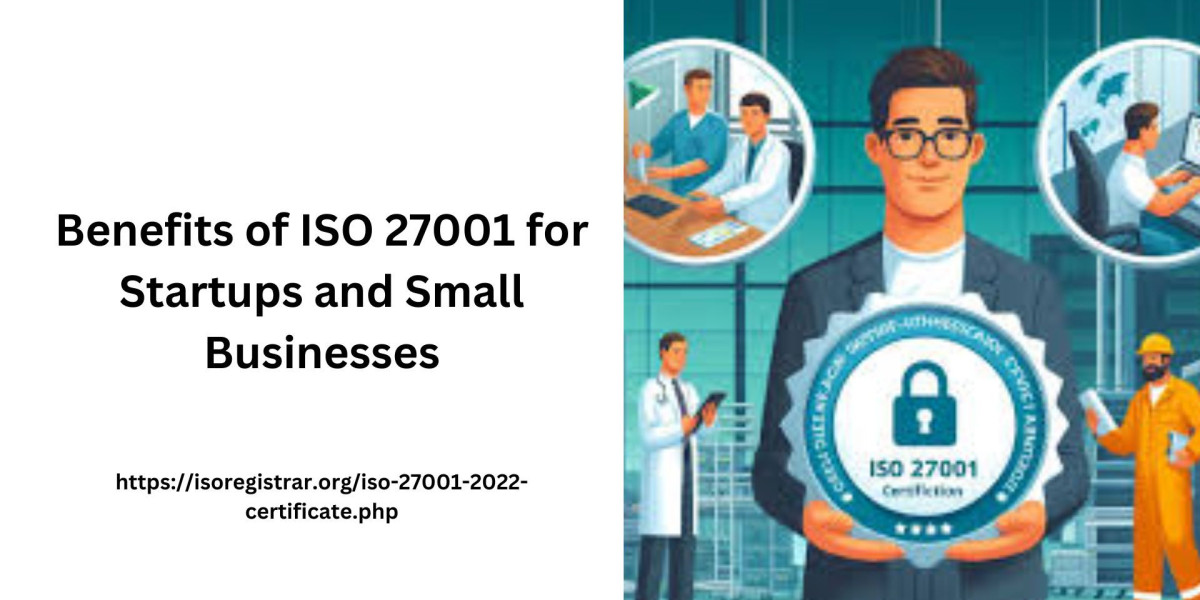In the modern digital landscape, information security is no longer a luxury or an afterthought—it is a critical requirement. This is especially true for startups and small businesses that often handle sensitive customer data, intellectual property, and financial information. While large corporations may have the resources to implement comprehensive security measures, smaller organizations may find it more challenging to secure their data effectively. This is where ISO 27001 certification can make a significant difference. ISO 27001, the internationally recognized standard for Information Security Management Systems (ISMS), offers a framework that organizations of all sizes can use to ensure their data protection practices are robust, efficient, and scalable.
For startups and small businesses, obtaining ISO 27001 certification provides several key benefits that can lead to improved operations, stronger customer trust, and a competitive edge in the market.
1. Building Trust and Credibility
One of the most valuable benefits of ISO 27001 certification for startups and small businesses is the enhanced trust and credibility it brings. Customers, partners, and investors are increasingly concerned about the security of their sensitive information. By obtaining ISO 27001 certification, a startup demonstrates that it takes information security seriously and follows best practices to protect its data. This certification acts as a third-party endorsement, reassuring stakeholders that the business is adhering to internationally recognized security standards. For small businesses looking to establish themselves and attract new customers, ISO 27001 can serve as a powerful differentiator, building confidence among potential clients.
2. Mitigating the Risk of Data Breaches
Small businesses are particularly vulnerable to data breaches and cyber-attacks due to their often limited resources for security. According to numerous studies, cybercriminals frequently target smaller organizations because they are perceived as easier targets. ISO 27001 helps mitigate this risk by providing a structured approach to identifying, assessing, and managing information security threats. The standard requires businesses to conduct regular risk assessments, implement controls to protect against identified threats, and continuously monitor their security practices. By proactively managing security risks, startups and small businesses can significantly reduce the likelihood of data breaches, saving them from costly financial and reputational damage.
3. Compliance with Legal and Regulatory Requirements
In many industries, businesses are required to comply with strict data protection laws and regulations, such as the General Data Protection Regulation (GDPR) in the European Union or the Health Insurance Portability and Accountability Act (HIPAA) in the United States. For startups and small businesses, understanding and navigating these legal requirements can be complex and time-consuming. ISO 27001 helps simplify this process by aligning an organization's security practices with legal and regulatory requirements. Achieving ISO 27001 certification ensures that businesses meet the necessary compliance standards, reducing the risk of legal penalties or reputational damage associated with non-compliance. For small businesses that are just getting started, this can also make it easier to scale their operations in regulated markets.
4. Improved Business Processes and Efficiency
Implementing ISO 27001 is not just about securing data—it also improves overall business processes. The standard encourages organizations to adopt a systematic approach to managing information security, which often leads to better internal workflows, clearer responsibilities, and more efficient use of resources. For startups and small businesses that are still in their formative stages, ISO 27001 provides a framework that streamlines processes, ensuring that information security is integrated into every aspect of the business, from day-to-day operations to strategic decision-making. This increased efficiency can lead to cost savings and help businesses better allocate their resources.
5. Increased Competitive Advantage
In a highly competitive business environment, standing out from the crowd is crucial for success. ISO 27001 certification gives startups and small businesses a competitive edge by demonstrating their commitment to information security. In many industries, especially those handling sensitive data like finance, healthcare, or technology, ISO 27001 certification can be a deciding factor for clients when selecting a service provider or business partner. Being ISO 27001 certified signals to customers that the business prioritizes their privacy and security, which can attract new clients and build stronger business relationships. This can be particularly valuable for small businesses looking to expand their client base and grow their reputation.
6. Enhanced Internal Security Culture
For startups and small businesses, information security is often handled by a small team or even a single individual. In such environments, it can be difficult to foster a culture of security awareness throughout the organization. ISO 27001 helps address this by creating clear roles and responsibilities related to information security and ensuring that everyone within the business is involved in maintaining secure practices. The standard encourages ongoing employee training, regular reviews of security measures, and the integration of security into everyday business operations. This culture of security awareness is essential for protecting sensitive data and reducing the chances of human error, which is often the root cause of security breaches.
7. Scalable Security Framework for Growth
As startups and small businesses grow, their information security needs become more complex. ISO 27001 provides a scalable framework that can evolve as the business expands. Whether a company is increasing its workforce, expanding into new markets, or handling more customer data, ISO 27001’s principles can be adapted to suit changing business needs. This scalability ensures that businesses can continue to meet their information security objectives while adapting to new challenges. Instead of scrambling to implement security measures as the business grows, startups can rely on the established ISO 27001 framework to guide them through the expansion process securely.
8. Ongoing Improvement and Risk Management
ISO 27001 follows the Plan-Do-Check-Act (PDCA) model, which emphasizes continuous improvement. For startups and small businesses, this means that their information security practices will evolve in response to changing risks and threats. The process of regular audits, reviews, and risk assessments ensures that businesses are always proactive about information security, rather than reactive. This continuous improvement helps businesses stay ahead of emerging security threats and maintain a robust defense against cyber-attacks and data breaches.
The process for ISO certification
Step 1: Visit the ISO Registrar's website at isoregistrar.org.
Step 2: Fill out the online form and submit it.
Step 3: Following submission, you will be presented with your payment options. Complete the payment to proceed.
Step 4: Upload the required information, such as your GST number, Aadhaar card, PAN card, and relevant invoices, after the payment has been made. More details are available on the webpage.
Step 5: An ISO representative will contact you to help you with the certification process.
Step 6: Within three to five business days, you will get an email with your ISO certificate.
Note: Apply for iso 9001 certificate- quality management systems
Conclusion
ISO 27001 certification offers a wide range of benefits for startups and small businesses. From building trust with customers and partners to improving internal processes and ensuring compliance with legal requirements, the standard provides a structured and efficient approach to managing information security. By adopting ISO 27001, startups and small businesses can enhance their credibility, reduce the risk of data breaches, gain a competitive advantage, and create a strong foundation for future growth. In today’s increasingly digital and interconnected world, achieving ISO 27001 certification is a smart investment that can lead to long-term success and security.








